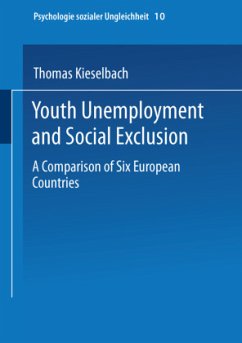This volume draws attention to the concept of social exclusion in the context of unemployment as well as to vulnerable groups of young unemployed people with regard to social exclusion in six European countries. It is based upon the results of an international research project (Youth Unemployment an Social Exclusion: Dimensions, Subjective Experiences, and Innovative Institutional Responses in Six Countries of the EU) (YUSEDER) conducted in the framework of the research programme Targeted Socio-Economic Research (TSER) of the European Commission. Partners from six European countries with differing scientific backgrounds (health psychology, public health research, psychatry, industrial sociology, medical sociology) from six European countries participated in this project.
The concept of social exclusion has gained an impressive importance in the European policy debate. The refused entry to the labor market for members of the younger generation increases the risk of social exclusion for the affected youth as well as for the social fabric in general. The contributions of this volume illustrate an initial approach to analysing and comparing theoretical reflections about the meaning and extent of social exclusion for young unemployed people from a comparative perspective. The research has been carried out in three Northern European countries (Sweden, Germany, Belgium) an three Southern European Countries (Spain, Italy, Greece). For each country a specific national report ist presented.
The comparative section describes and attempts to explain the similarities and dissimilarities between countries having rather diverse histrorical and social understandings of being socially excluded or marginalised für young people
The concept of social exclusion has gained an impressive importance in the European policy debate. The refused entry to the labor market for members of the younger generation increases the risk of social exclusion for the affected youth as well as for the social fabric in general. The contributions of this volume illustrate an initial approach to analysing and comparing theoretical reflections about the meaning and extent of social exclusion for young unemployed people from a comparative perspective. The research has been carried out in three Northern European countries (Sweden, Germany, Belgium) an three Southern European Countries (Spain, Italy, Greece). For each country a specific national report ist presented.
The comparative section describes and attempts to explain the similarities and dissimilarities between countries having rather diverse histrorical and social understandings of being socially excluded or marginalised für young people








